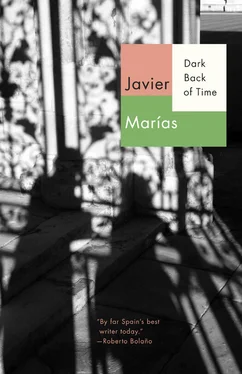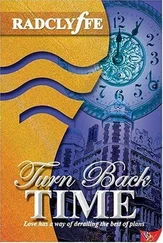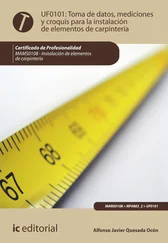“For the moment I can say only that before dying he also published A Journey in Ireland (1921), and that after his death, in addition to the aforementioned title of 1933, Scots Guard (1934), Love and Strive (1936) and Aspects of England (1937) were published. Under his own name or under the pseudonym of Herbert Gore, several of his stories appeared in the Thrills series and other anthologies of the 1930s. The present tale, ‘The Flats,’ written in a prose so pure that we may well decide Conan Doyle was right, comes from John Rowland’s 1937 anthology Path and Pavement .”
It’s not at all strange, given the far-fetched, novelistic sound of this and other biographical notes in the anthology, that the one dedicated to the nonexistent Denham failed to arouse any suspicion or attract undue attention; either none of them was believed and doubt was cast on the authenticity of all the stories, or each and every one was accepted without a quibble. Some readers were inclined towards the first stance and surmised that the nineteen stories were, without exception, all mine under different names. Would that it were true, because at least eighteen of them were well worth laying claim to. (Though really, it would have been quite foolhardy and naive of me to attribute apocryphal stories to the famous and much studied author of The Alexandria Quartet or to a very well known former Prime Minister of Her Majesty the Queen.) Other more prudent readers thought that “only” three or four were mine, among them no doubt the one by Gawsworth, whom not a few of my readers still took for a fictional character. And I recall that some friends, whom I let in on the game and challenged to unmask me, failed shamefully and didn’t hit on my story even at the fifth guess; my estimable father, who has known me for some time but not as well as he thinks, hesitated between crediting me for the story by Middleton, the suicide — which was a little disturbing, though more to me or to him I don’t know — or the one by Denham; Don Juan Benet didn’t waver for an instant and tore off my mask at the first try.
Getting back to Ewart and his mysterious death, I was indeed unable to find out anything about it before the anthology’s publication, and though I am lazy and passive, I don’t think I’m all that bad at researching obscure figures and dates. But after my first efforts I didn’t persist, or I postponed farther investigation. A few months later, however, I received two letters, almost in succession, from Mexico: apparently there is great curiosity (and hence exhaustive documentation) about the foreign writers who have passed through. Of Wilfrid Ewart, forever buried in its violent soil, there was, nevertheless, no information on record, which had made an investigation of the matter a challenge, according to my two correspondents, who each undertook to alleviate the ignorance I had confessed to in the biographical notice that set the whole thing off.
The first letter was from a writer, Sergio González Rodríguez, an essayist, and was accompanied by a lengthy article of his, already published in the magazine Nexos in December 1989, under the title, “El misterio de Wilfrid Ewart.” The second, dated in March of 1990, came from a young man named Rafael Muñoz Saldaña, who, with fewer journalistic resources and bibliographical means at his disposal, told me he proposed to “solve the enigma” that I “had left open.” He announced that the “fieldwork” he had carried out had led him “down unexpected paths,” but in the end had “born fruit in concrete results.” “Though I now have a general idea,” he said, “of the circumstances under which Ewart died, there remain many unresolved issues to which I must still respond.” The young man in question — he owned up to being twenty-three, which makes him thirty now — took the news that his older compatriot, Sergio G.R., had scooped him like a good sport. I sent him a copy of S.G.R.’s article, and he answered regretfully, and with a note of pride, that the information the article provided was “exactly the same as that I had obtained.” But he added with fine resignation: “What I did to explain this mystery to myself is perhaps more interesting than the mystery itself; I met many unusual people, among them an elderly woman who has been racked by nausea for fifteen years, and a priest who restricts access to the church where he officiates, for fear of attacks. Someday I’ll tell you all about my adventures in full detail.” And, clearly disappointed nonetheless, he added, “If, in the beginning, my intention — which was not without a certain theatricality — was to make a spectacular revelation of the circumstances of Ewart’s demise, now I have a more sensible project,” which project, incidentally, was not the least bit sensible and I immediately dissuaded him from wasting his time on something that wasn’t even theatrical or spectacular. He also had a few comments for me about All Souls , which he had just read: “On page 89,” he wrote, “he begins speaking about visiting some used book stores; at that moment I stopped reading and thought, ‘What would I look for if I were there? Books by Arthur Machen,’ I answered myself, and on turning the page I was quite surprised that the protagonist of the novel did the same … For some time now I’ve been a devotee of Arthur Machen, though unfortunately I know very few of his books …” It came as no surprise when, a few lines further down, the young man asked me about the “Machen Company,” a supposed association of enthusiasts of the work of the Welsh writer and Archduke of Redonda that was mentioned several times in All Souls and of which the narrator became a member at the prompting of the character named Alan Marriott. Muñoz Saldaña wished “to contact it” if it actually existed. Given that this “Company” was invented, and I didn’t want to disappoint the youthful Mexican Machenian even more, I sidestepped this disillusionment by writing back, “I fear that for the moment I’m not authorized to answer you on that point. Perhaps later,” as if it were a secret and mysterious sect that one couldn’t simply contact just like that, with oceans in between, without first having evinced a certain merit or passed certain tests. Finally, and after I had let him in on the joke about Denham, he answered, very generously, that “your charade amused me quite a bit … I adore these kinds of games, above all when they are carried out well, as in the case of John Bendham,’ falsifying — involuntarily, I believe — even more, and so quickly, my third false name, since previously I had used two others for very minor or shady writings. I liked the part about the “charade.”
Though we’ve gone on writing each other from time to time over the years, I’m still hoping Muñoz Saldaña will someday tell me about the woman who’d been nauseous for fifteen years, and who was, in fact, the thing that most interested me in his early letters. “What do you mean, nauseous?” I remember asking him. “What’s wrong with her? How can she know that she’s nauseous? If she’s been that way for so long, you’d think by now it would have become her natural state. The phrase you used was enigmatic indeed.”
What comes next has already partially been told in an article called “Remember You Are Mortal,” included in my 1993 book Literatura y fantasma or Literature and Ghosts (I have to admire my own honorable conduct, duly notifying the reader of every antecedent), and a lot of material both there and here is owed, with thanks, to my two Mexican correspondents, who in any case pointed me on my way to finding out more about the short life and sudden death, without testament, of Wilfrid Ewart. Sergio González Rodríguez, in fact, went beyond the facts reported in his article, “The Mystery of Wilfrid Ewart,” and ventured certain hypotheses which, though improbable, were amusing and, of necessity, Borgesian, in order to farther clarify the mystery, and he generously called on me to develop them (“Only a writer like Javier Marías could indulge without stigma in this type of lucubration …”: I’m afraid I’m going to disappoint him, and not only because of my tendency to throw in blots and smudges). To him I owe the profusion of citations from the Mexican newspapers that in the early days of 1923 reported the news of a foreigner’s death on New Year’s Eve, and, as gratuitous and absurd as the story was (and it was that in the extreme), made it even more sarcastic towards the dead man and distressing to those closest to him.
Читать дальше












